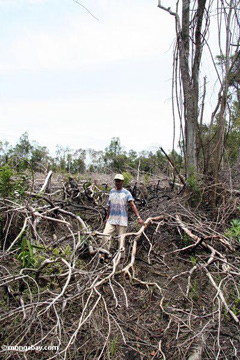REDD will fail if needs of forest communities aren’t addressed
REDD will fail if needs of forest communities aren’t addressed
mongabay.com
December 7, 2007
New report argues that unless REDD mechanisms are properly designed, carbon credits-for-forest conservation schemes will not address key drivers of deforestation
Initiatives to reduce emissions by reducing tropical deforestation (REDD) will fail unless policymakers adequately address the underlying drivers of forest degradation and destruction, argues a new report published by the Center for International Forestry Research (CIFOR).
The report, released at the United Nations Conference of the Parties (COP-13) climate meeting in Bali, says that while REDD holds a great deal of promise, success will require sufficient financial incentives to reverse the “political and economic realities” that cause deforestation.
Deforestation, which accounts for around 20 percent of anthropogenic greenhouse gas emissions, is increasingly driven by macroeconomic trends like commodity prices, currency fluctuations, infrastructure development, and government subsidies and economic policies, rather than subsistence agriculture and logging. Government policies often favor large corporate interests, like industrial agriculture, over community rights to forest resources. Corruption in the forestry sector undermines efforts to create more fair and equitable access to resources in many developing countries.

|
“After being left out of the Kyoto agreement, its promising that deforestation is commanding center-stage at the Bali climate talks,” said CIFORs Director General, Frances Seymour. “But the danger is that policy-makers will fail to appreciate that forest destruction is caused by an incredibly wide variety of political, economic, and other factors that originate outside the forestry sector, and require different solutions.”
CIFOR cites recent trends in Indonesia, the Brazilian Amazon, and the Congo Basin as examples. In Indonesia, surging demand for biofuels, timber, and pulpwood is driving large-scale destruction of carbon-rich peatlands and rainforests, which are logged for wood and then converted for oil palm plantations. The process releases scores of millions of tons of carbon emissions every year. Meanwhile in Brazil, deforestation is driven more by currency swings, interest rates, and land prices than it is by poor farmers simply trying to eke out a marginal existence. In sub-Saharan Africa, fuelwood extraction and charcoal production are leading factors behind the continents loss of 4 million hectares a year, but pressure from industrial interests — especially the industrial agriculture sector — are rising.

|
“Policies that seek to halt deforestation will need to be crafted to address diverse local situations and target activities in areas such as agriculture, transportation and finance that lie well beyond the boundaries of the forest sector,” said Markku Kanninen, one of the authors of the report. “The perverse subsidies that provide incentives for clearing forest must be removed and efforts to secure property rights for local forest communities should be encouraged.”
The report is hopeful that financial incentives that compensate landowners for “environmental services” like carbon storage and watershed protection, but stresses that benefits need to reach rural populations. Otherwise the same industrial interests presently driving deforestation could well position themselves to seize rights to income streams from REDD and other ecosystem payment schemes, intensifying the “severe poverty that now afflicts the majority of rural forest communities in the developing world.”

|
“Such payments to individual land-users have the potential to ‘flip’ financial incentives from favoring forest destruction, as they now do, to favoring conservation. But the key question is whether or not REDD incentives will be sufficient to flip political and economic decisions at the national level that drive deforestation,” said Seymour. “Since forest property rights are often very unclear, payment for carbon services could end up providing incentives for corrupt officials or local elites to appropriate this new forest value from local communities. We’ve seen this happen before in similar situations, and theres every reason to believe, given the kind of money now being paid for carbon credits, that it could happen again.”
The report goes on to urge policymakers to design “REDD strategies with a clear understanding of potential pitfalls and what can be done to avoid them,” including strengthening weak governance mechanisms and ensuring that the process is fair to poor forest communities.
“We need to temper the desire for maximum reduction in forest-based carbon emissions with regard for the legitimate rights of forest communities to realize the income potential of their forestlands,” Seymour said. “At times there will be trade-offs between reducing carbon emissions and reducing poverty.”
Related articles
Carbon credits for forest conservation concept faces challenges
(11/27/2007) While environmentalists, scientists, development exports, and policymakers across the political spectrum are ethusiastic about the idea of offsetting carbon emissions by preventing deforestation (a concept known as “avoided deforestation” or Reduced Emissions from Deforestation and Degradation (REDD)), the concept still faces many challenges, especially in implementation. Working to address these issues is SEKALA, an Indonesia-based NGO that was formed in 2005. In an interview with mongabay.com, Ketut Deddy, director of SEKALA, said he is optimistic that REDD can deliver benefits to rural populations while protecting forests and their resident biodiversity.
Carbon offset returns beat forest conversion for agriculture in Indonesia
(11/21/2007) Conversion of forests and peatlands for agriculture in Indonesia has generated little economic benefit while releasing substantial amounts of greenhouse gases into the atmosphere, reports a new study from the the World Agroforestry Centre (ICRAF), the Center for International Forestry Research (CIFOR) and their Indonesian partners.
Does palm oil alleviate rural poverty in Malaysia?
(10/23/2007) While it is often argued that the economic benefits of oil palm plantations outweigh the environmental costs of converting biodiverse ecosystems to monocultures, new analysis suggests that the role of plantations in reducing rural poverty may be overstated.














